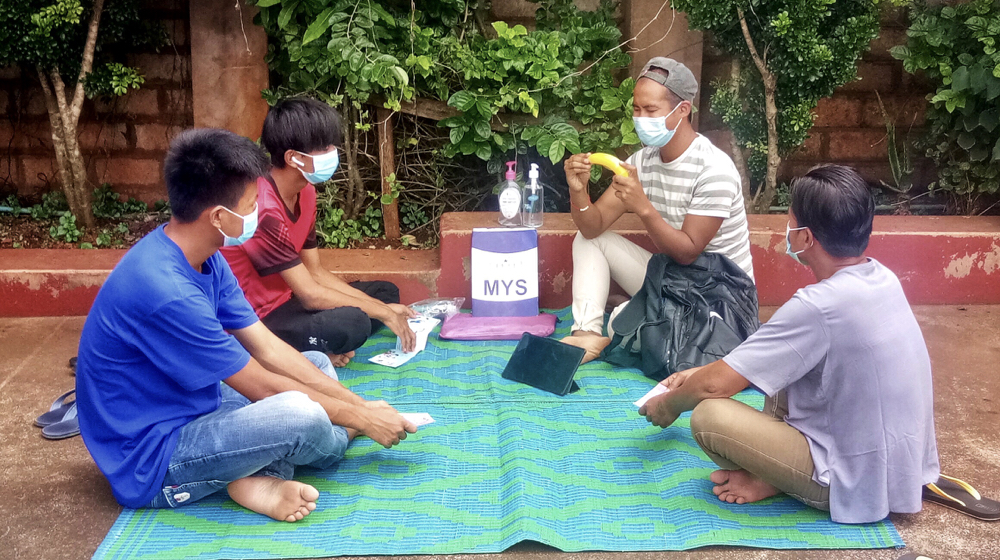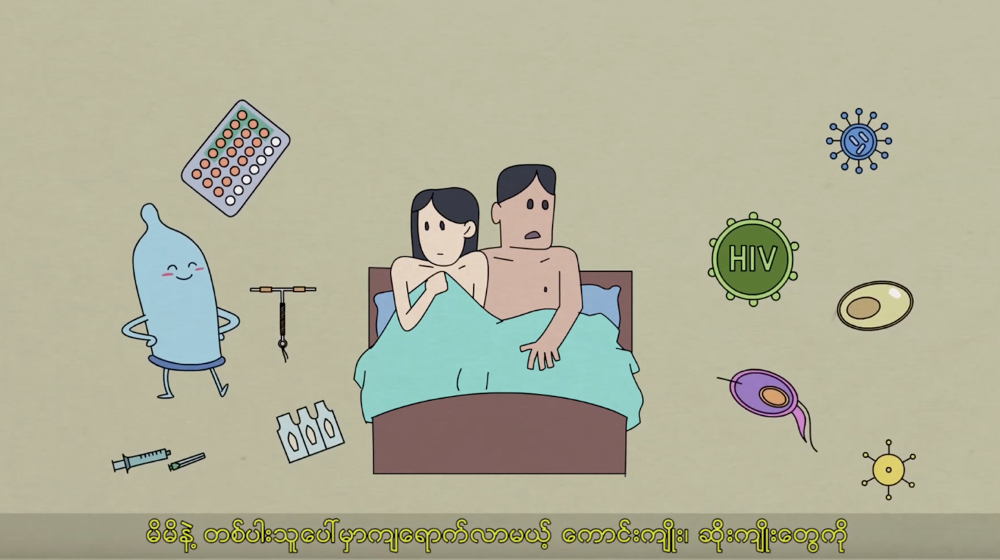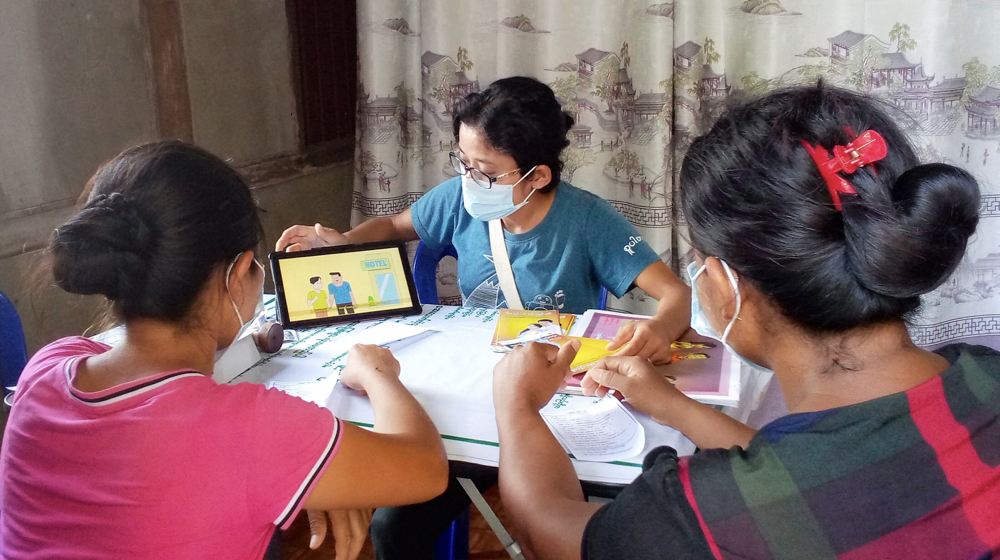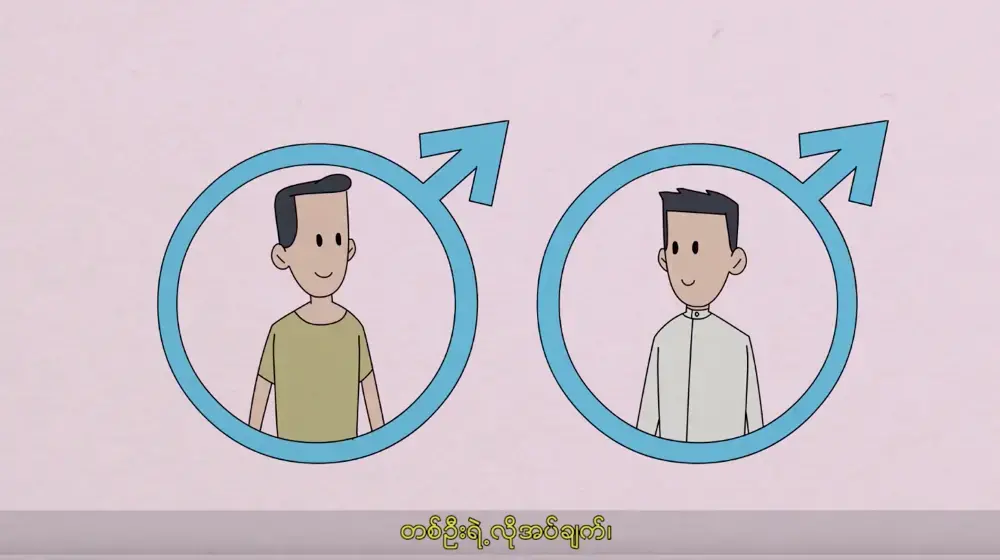"Peer-to-peer education is the best way to reduce HIV infections”
“Peer-to-peer education is the best way to reduce HIV infections”
Myanmar Youth Stars is a network that provides information for young key populations at high risk of HIV in Myanmar, including young men who have sex with men, transgender people, young people selling sex, and people who inject drugs. The network works with more than 1,500 people in 18 townships across Myanmar, advocating for the rights of these key populations on issues related to HIV and sexual and reproductive health (SRH). Myanmar Youth Stars also focuses on networking, capacity strengthening and evidence-based assessments of key populations within the community.
Myanmar Youth Stars is driven by an adaptable platform of resources that can meet the needs of these vulnerable populations. “We provide education to invisible populations” says Min Thet Phyo San, one of the leaders of the project.
Myanmar Youth Stars began community-led programs in 2012. During the COVID-19 pandemic they moved to an online approach, and “are facing even more challenges since the military coup,” he says.
“We provide education to invisible populations."
In this challenging context, Myanmar Youth Stars works with peer-to-peer networks to reach at-risk populations. “Our goal is to raise awareness to reduce HIV infection,” says Aung Phyu Htut who also works with Myanmar Youth Stars. “Peer-to-peer education is the best way to reduce HIV infections, and increase awareness and uptake of HIV and STI testing.”

Aung says the chaos of the current unrest is especially hard for people living with HIV. “The health services and assistance mechanisms for people with HIV are not working because of the insecurity. We cannot neglect key populations because in Myanmar, we have a lot of young people living with HIV.”
"Our goal is to raise awareness to reduce HIV infection. Peer-to-peer education is the best way to reduce HIV infections, and increase awareness and uptake of HIV and STI testing.”
-Aung Phyu Htut, Myanmar Youth Stars
With the ongoing uncertainty, government hospitals are closed and people cannot get tested or seek treatment for HIV. “Many of the population have gotten opportunistic infections and are dying at home,” Min says. “Our essential health services are simply not functional.”
Aung says security is affecting all HIV responses and services in Myanmar, “Even if you take a patient to a government hospital, they do not provide admission or treatment for HIV-positive patients.”
Only limited sexual and reproductive health services like family planning, for key populations, are still accessible from local and international NGOs.
The Myanmar Youth Stars network has an in-depth understanding of the local contexts and languages where they deliver their sessions. The workshops resonate with local communities because they are delivered in accessible, culturally-adapted formats and designed to prompt dialogue about complex issues.

The program allows peers to focus on the areas where clients need more information. “If it’s gender-based violence, HIV testing, HIV treatment or mental health services, our peer educators get them information and even help them ring the appropriate social services number,” Aung says.
Despite frequent internet and power outages, he says young people are able to go online, so the project designed the platform to support groups with online tools. The project is maintaining access to services for high-risk populations, but also increasing skills within the community by providing continuous mentoring to the members on how to engage their peers and empower them. Project materials are designed to help transfer critical information to their community members.
Even before the current pandemic, the idea was to deliver comprehensive sexuality education, with Myanmar Youth Stars imparting information to cover gaps in practical skills or knowledge. Now with the deepening political crisis where HIV prevention and care, SRH, and legal assistance have been disrupted, Min says the peer network has become even more important. Myanmar Youth Stars members are respected leaders in their communities and through media training, they learn digital and communication skills to increase their overall effectiveness as advocates and allies.
One of the biggest challenges of restricted movement is reaching people who inject drugs with just online outreach. Min says: “Some do not know how to join online education sessions through social media platforms and teleconferencing applications, and some do not have a smartphone.”
“The stigma and discrimination in communities and even in families, make vulnerable groups marginalized and even more at-risk to gender-based violence or sexually-transmitted infections.”
-Aung Phyu Htut, Myanmar Youth Stars
Aung says people who inject drugs struggle with limited access to needles especially in remote areas during the curfew period, where shops close before 7 pm. This limited access can lead to risky behavior. Aung reports cases of people who inject drugs keeping needles distributed from NGO and then re-sold to their peers. “People took the needles, used them and sold them back to other people who then were injecting them. This increased transmission of HIV and other blood-borne viruses like hepatitis C virus. We need to inform people on how to protect themselves from this kind of risk.”
Since the start of 2021, he reports a rise in suicides in the key population and increasing rates of HIV infections based on available figures, which he admits are incomplete. “The stigma and discrimination in communities and even in families, make vulnerable groups marginalized and even more at-risk to gender-based violence or sexually-transmitted infections.”
Myanmar Youth Stars materials include the phone number of the mental health service hotline in Myanmar and members are given training in basic psychosocial counselling to help identify and refer cases of concern.
As the multiple crises continue, the dangers for populations at high risk of HIV are multiplying. Min says the challenges will not deter the Myanmar Youth Stars from sharing the vital messages about HIV and support for those most affected. “We are working hard for the community, we cannot stop.”

UNFPA supports Myanmar Youth Stars in their ongoing efforts to prevent the spread of HIV and AIDS in the country. The partnership will continue in 2022 to integrate mental health and psychosocial support services for young key populations including young LGBTQI, young sex workers, young drug users, and young people live with HIV aged 15 - 30.
Learn more
https://www.facebook.com/MyanmarYouthStars/


